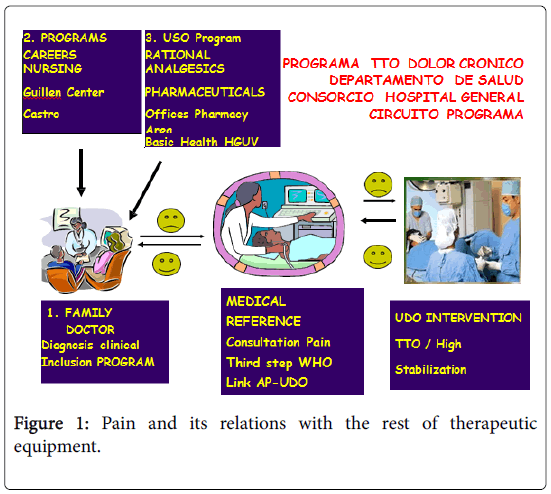Relations Primary/Specialized Attention: The Role of the Referents (Primary Care Pain Program "Referent in Pain")
Received: 13-Mar-2017 / Accepted Date: 28-Apr-2017 / Published Date: 30-Apr-2017 DOI: 10.4172/2161-1165.1000306
Abstract
There has always been an important limitation in the information between primary care and specialized care, to such an extent that they did not know what others were doing. The new information systems (Abucassis, Pangea, Syas, etc.) wanted to improve this situation but in no case achieved a direct interaction between the health interlocutors of a patient nor did it serve as a learning tool for the teams. These situations generate lists of long waits and not being able to distinguish the urgent from the so urgent except by the individual criterion of the referrer. It is in this scenario when a promising project arises under the YAYO program, which is the implementation of the referral figure of pain in A. Primary, with specific training and interest in the subject and with direct relation with the hospital service of reference.
Keywords: Pain; Primary care; Specialized care
166083Objective
To carry out a pilot project, proposing the circuits and tools used in the "REFERENTE EN DOLOR" program in a primary and its relations with the rest of therapeutic equipment (nursing, rehabilitators, pharmacists, social workers, etc.) as a multidisciplinary action tool in seeking the improvement of the patient and, above all, his quality of life (Figure 1).
Pilot Project
Guillem de Castro was the first health center where this project was started, the doctor "Referent" being Dr. Pedro Ibor and collaborating as senders the rest of professionals of the center. The pilot program was implemented from September 2009 to February 2010 with a total number of patients cared for 80. In consultation twice a week (Figures 2).
Referrals to the Pain Unit of the General Hospital of Valencia were 5 (6.25%), for the following reasons: 3 patients for neuropathic pain, one fibromyalgia in a young patient and one patient with pluripathologic somatic pain, following referral criteria previously.
Consensuated, convenes in Specialized Unit in <1 week. During the program period, the referent trained in the area of pain in the Hospital Unit.
The overall perception of improvement of care in pain of the professionals was very good communicating the patients a high degree of satisfaction.
References
- Aliaga L, Baños JE, Barutell C (1996) Pain and clinical use of analgesics. Ed MCR. Barcelona.
- Gallo-Vallejo FJ (2011) Handbook of the Family and Community Medicine Resident.
- Zurro AM, Pérez JFC (1994) Primary Care. Concept, organization and clinical practice (2ndedn.) Ed. Doyma. Barcelona.
- Moya Mir MS. The doctor before the pain. Urgent action guide. Edicomplet, S.A. Madrid 1998.
- Edwards WT (1992) Management of acute pain: A practical guide. IASP Seattle 1992: 11-21.
- Serra J (2017) Peripheral mechanisms of neuropathic pain. Pain 158: 261–272.
Citation: Alegre AM (2017) Relations Primary/Specialized Attention: The Role of the Referents (Primary Care Pain Program "Referent in Pain"). Epidemiology (Sunnyvale) 7:306. DOI: 10.4172/2161-1165.1000306
Copyright: © 2017 Alegre AM. This is an open-access article distributed under the terms of the Creative Commons Attribution License, which permits unrestricted use, distribution, and reproduction in any medium, provided the original author and source are credited.
Select your language of interest to view the total content in your interested language
Share This Article
Recommended Journals
Open Access Journals
Article Tools
Article Usage
- Total views: 3396
- [From(publication date): 0-2017 - Jul 01, 2025]
- Breakdown by view type
- HTML page views: 2536
- PDF downloads: 860


